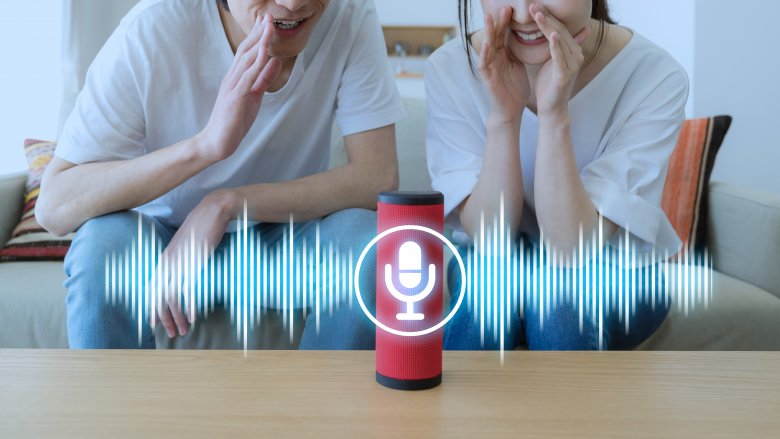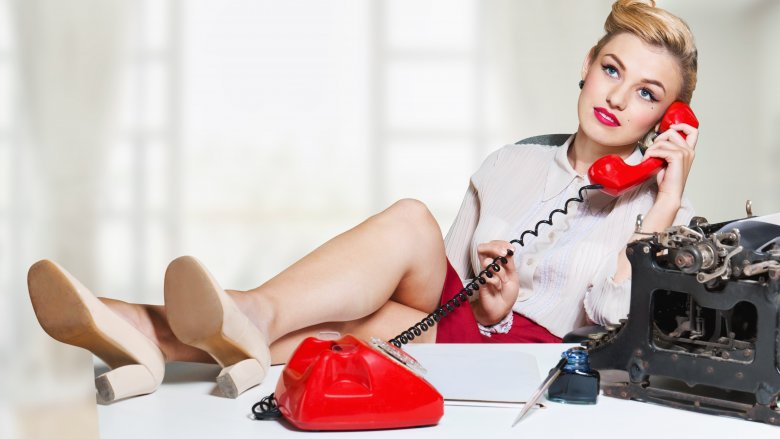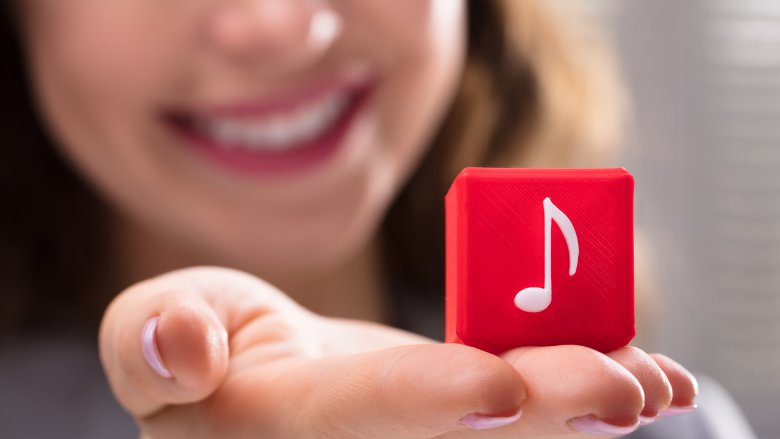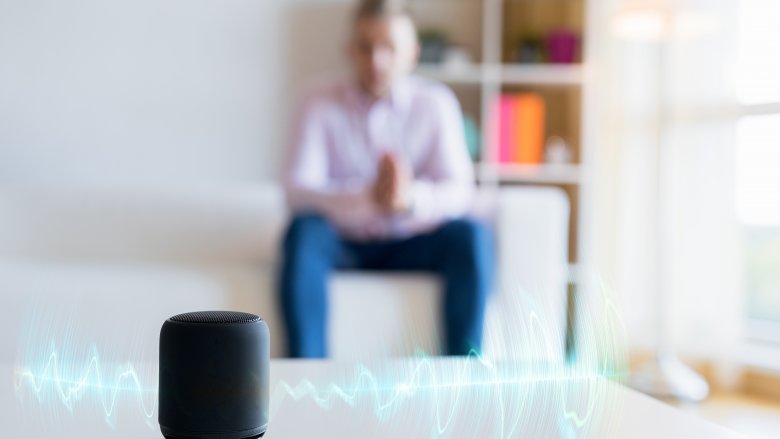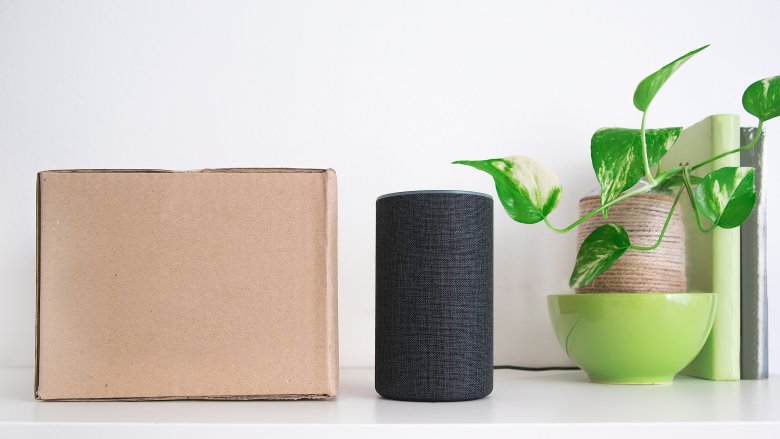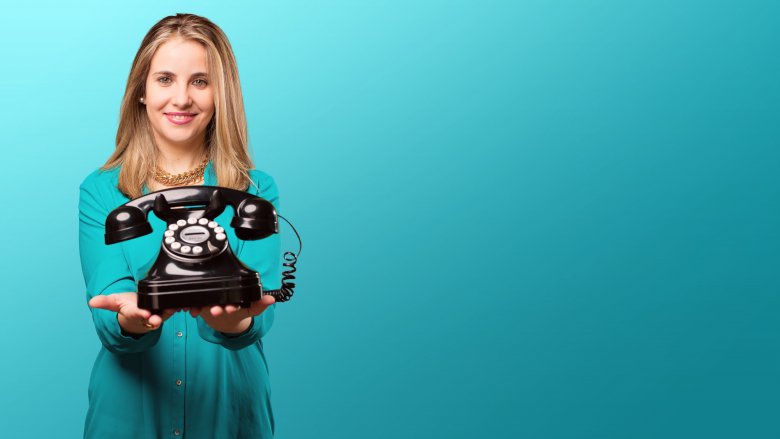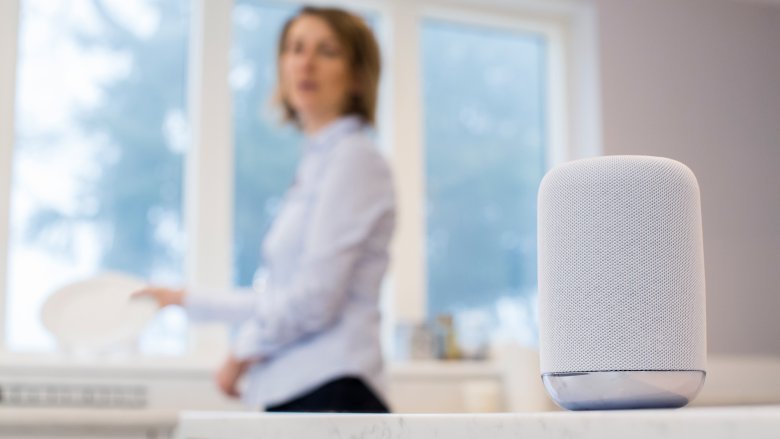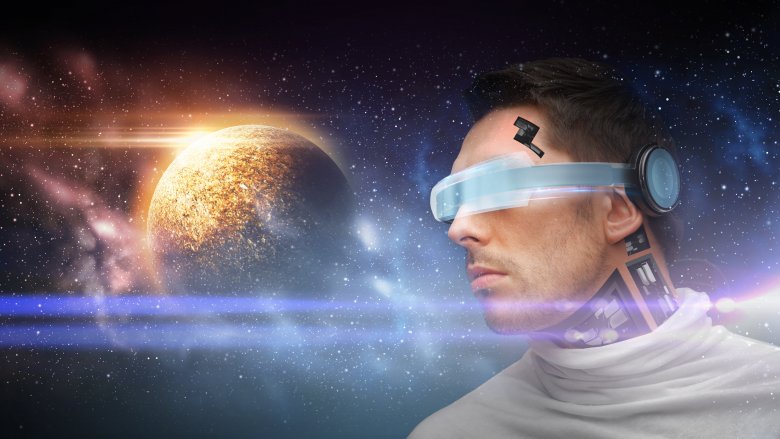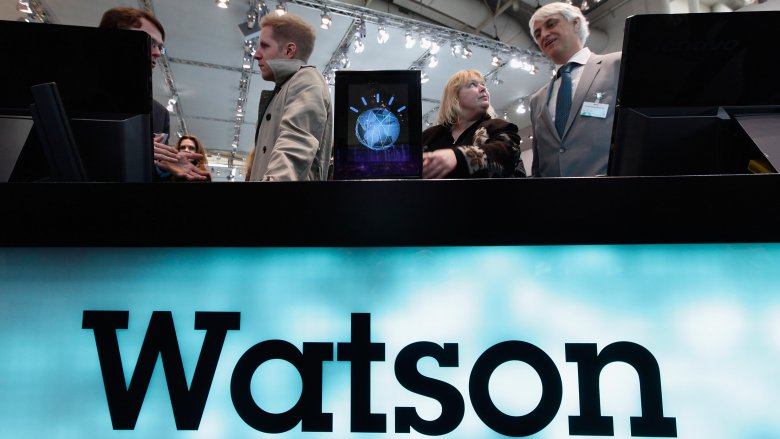This Is Why Voice Assistants Are All Female
Voice assistants really started when sat navs started telling us where to go, and occasionally steering us to the edges of cliffs and into lakes. Should we have been a little more suspicious about them? Probably, but mankind isn't good at learning from the mistakes our fictional counterparts make in the movies.
It didn't take long before voice assistants made the jump from our cars to our phones, and now they're even in our homes. Siri, Alexa, Cortana, Bixby ... they do everything from getting us directions to checking weather conditions and reminding us of all those pesky things we can't be bothered to remember for ourselves. Notice anything about them? They're all distinctly female, given women's names by default and soothing, feminine voices. Sure, it's easy to see why they didn't go with a voice that says "football coach in the locker room at halftime, and the team's down by a lot," but why not give these virtual assistants the voice of a sexy Italian man? Or helpful, fun Australian guy? Or ... any sort of man, actually. There are a few reasons for it, and they're almost as disturbing as the inevitable rise of the machines.
Because girls are assistants and secretaries
Remember Mad Men, where the guys did all the important work and the women kept track of all their appointments and other stuff they were too busy to do? Sound a bit familiar, sort of like everyone's relationship with Alexa or Siri?
The Atlantic says a huge reason voice assistants are female is because, well, they're assistants. They're digital helpers who organize, keep track of things, play music, and — here's an important part — shut the heck up when they're told to. Since voice assistants are essentially secretaries and women have traditionally filled the role of secretaries for years, it's just natural that the trend continues.
Just take Amy Ingram, the digital personal assistant who's so real that Business Insider reports she regularly fools people into sending her emails and talking to her like she's a real person. She sets up meetings and does all the stuff a human secretary would do, and creator Dennis Mortensen named her "Amy" because he'd once had a real-life assistant named Amy. He's said he doesn't think the tech world's tendency to give digital assistants female names is playing into old gender stereotypes, though ... but it's hard to deny there might be something to it.
Pretty voices
There's another theory as to why voice assistants are female, and that comes via Stanford University professor Clifford Nass and a 2011 CNN interview. He suggested people are just programmed to like women's voices better and that it's easier to find a female voice that appeals to a wide spectrum of people. He referred to studies that suggest this programming starts in the earliest stages of development, when babies in the womb spend months listening to their mother's voice all the time.
But, there's a catch, according to the Atlantic. Other studies show that people are a lot more critical of women's voices than they are of men's, especially women in radio. A 2014 study from the University of Miami found that women with vocal tics — like vocal fry, a creaky pitch — are judged extremely harshly. Men aren't subjected to the same levels of criticism, so Nass' theory may or may not be at play here.
Male-to-male stigma
Karl Fredric MacDorman is a specialist in human-computer interaction from Indiana University-Purdue, and he has another theory that says a heck of a lot about the way people interact not just with computers, but with each other. He and his colleagues have studied how people react to both male and female voices, including looking at which one people prefer. He found that people just like women's voices better, and he suspects it might have something to do with how relationships within gender boundaries are seen.
"I think men find women attractive, and women are also OK dealing with women," he told LiveScience. "I think there's a stigma for males to prefer males, but there isn't a stigma for females to prefer females."
He backed it up with research, surveying people to see what kinds of voices they preferred, then questioning them to see what they subconsciously gravitated toward. Both men and women favored the female voices, particularly when it was the disembodied type of virtual assistant most people carry around in their pockets.
It's all about satisfaction
Business Insider says female virtual assistants are definitely playing into a stereotype, but it's more than just relationship roles. They say female voices are used because people are more likely to see an inanimate object with a woman's voice as more helpful and more caring.
There are a ton of other words linked to how people view female devices, like cordial, sympathetic, pleasing, and friendly. Surveys of customers that regularly interact with Google Assistant, Alexa, Siri, and Cortana report they're about 90 percent satisfied with their device, and companies suspect that's in large part because it's easier to relate to a device you can think of as a sort of big sister you always wanted.
That's extra important when it comes to Alexa. Amazon's assistant isn't just going to tell you the weather, she's also going to help you with your shopping — like ordering more things from Amazon. The happier people are with their assistant, the more they're found to order — and there's a good chance that Alexa's big-sister personality makes it seem that much more natural to ask her for help with the shopping.
We're used to disembodied women talking
Back at the dawn of the age of the telephone, it wasn't easy to call someone. Callers would need to talk to a telephone operator and ask them to put the call through to the person on the other end, and those nameless, faceless operators were exclusively women.
Originally, telephone operators were plucked from the most unlikely demographic ever: the teenage boy segment. That's because telegraph operators were mostly male teens, and that was fine — they didn't need to talk to anyone. But boys haven't changed much in the last century or so, and according to the New England Historical Society, they were pretty unpleasant to customers. There were a ton of problems with swearing and practical jokes, so Alexander Graham Bell hired a young woman named Emma Nutt. She was polite, she was friendly, she memorized all the numbers there were, and she loved her job. She was so good at it, in fact, that telephone operator became one of the better jobs a woman could get (via Time).
Women were so much more pleasant than their teenage counterparts that by the end of the 1880s — a decade or so after Nutt first sat down at her switchboard — almost all operators were women. That means we've had a long time to get used to a helpful, disembodied female voice at the other end of our nifty new technological devices, and it's still that way today.
HAL 9000 was almost female
Quick, what's the only virtual assistant with a male voice that most people can think of? HAL 9000, the creepy, disembodied, all-seeing computer from 2001: A Space Odyssey. HAL made a huge impact on pop culture and our relationship with computers, so huge that the American Film Institute named him #13 on their list of film's 100 Greatest Heroes & Villains. (Sorry to spoil a 50-year-old movie.)
HAL is absolutely terrifying, and anyone who says otherwise is lying. He wasn't always a he, though, and the Smithsonian says the AI computer was originally written as a female entity named Athena. She's described as female through early script drafts (via the Computer History Museum), and it wasn't until later that Athena became HAL (from the words "heuristic" and "algorithmic," Kubrick says) and actor Douglas Rain was cast as the computer's voice.
The Smithsonian also suggests HAL's prominence in pop culture has instilled something in us, a fear and suspicion of male-voiced computers going back decades. If the computer had stayed Athena and a female voice actor had been cast, would everyone feel differently about voice assistants today?
That generic accent
The voices of virtual assistants don't just have gender in common, they also have a common accent. According to the New York Times, that politely generic, almost Canadian accent that's programmed into so many virtual assistants is a holdover from Douglas Rain's HAL 9000 — the original virtual assistant.
They say HAL (and Rain) have "become the default reference ... for the humanesque qualities of what a sentient machine's personality should be." The calm, regular cadence, the polite inquiries when something isn't understood, the emotional detachment, the deference that's not quite pandering — it's easy to hear once it's pointed out.
Douglas Rain is the voice that made it into the movie, but he wasn't the first. Originally, HAL had all the emotion of a flesh-and-blood character, and he even cried at one point. Actor Martin Balsam recorded the lines, but it wasn't quite right and, Kubrick said, "a bit too colloquially American." So he recruited Rain after hearing his voiceover work on a documentary, saying his voice was "neither patronizing, nor is it intimidating, nor is it pompous, overly dramatic, or actorish." Sounds familiar, doesn't it?
Male AI has been associated with evil or free will
No one should ever underestimate the power pop culture has over other facets of the world, and it's entirely possible that fictional AI has helped shape perceptions about what AI should be in the real world.
The idea of evil male AI started with HAL, and it's continued. Just look how movies deal with technology that has a gender identity. The Terminator was originally male, and so was Ultron and I, Robot's Sonny. See a pattern here?
Even when male AI isn't outright evil, there's a sense that it has a bit of free will. Just look at Iron Man's JARVIS. He ends up becoming his own man-robot-android-whatever when he body-hops into The Vision. Tony Stark eventually replaces him with female assistants for both himself and Peter Parker. According to the Conversation, movies have male AI that is generally evil or independent, while female AI is the helpful assistant. The real world has helpful assistants and, like their fictional counterpart, they're female.
Not an assistant
Some voice assistants, like Siri, have options to switch to a male voice from their default female persona. But when it comes to default male voices, the biggest one belongs to one flagship program, a program that is more powerful than his female counterparts and that can multiply.
He's Watson, and according to Technology Review, he's not only the computer that won Jeopardy! in 2011, but he's also a technology that's branched out into a whole slew of applications. He's helping build other AI by processing languages and analyzing voices and emotions, and he's even assisting doctors in doing a deep dive into people to diagnose illnesses faster. There's even a sector of him that's called Watson Assistant, and according to the Verge, he's not actually an assistant — he'll help companies make their own versions of Alexa and Siri. Watson is becoming integrated into all sorts of products and programs, but what he's not is an assistant in his own right. That's... creepy.
